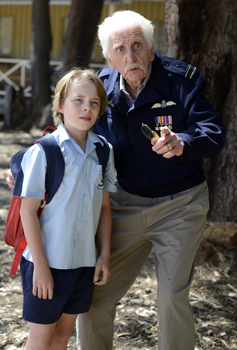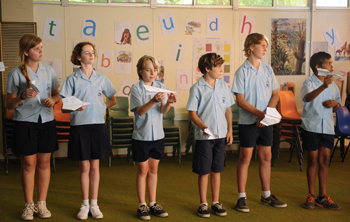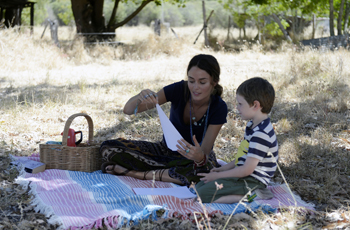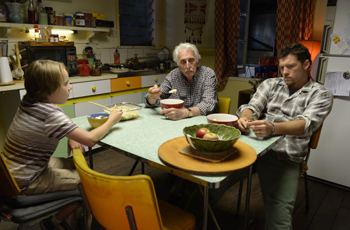Robert Connolly Paper Planes Interview

Robert Connolly Paper Planes Interview
Cast: Sam Worthington, Ed Oxenbould, Deborah Mailman, Ena Imai, Nicholas Bakopoulos-Cooke, Julian Dennison, Terry Norris, Peter Rowsthorn, David Wenham
Director: Robert Connolly
Rated: G
Running Time: 96 minutes
Synopsis: Twelve-year-old Dylan lives with his father in the West Australian outback. One day at school Dylan discovers he is extremely good at making and flying paper planes. While attempting to refine and develop his newly realised ability, Dylan finds himself caught up in the world of competitive paper-plane making, leading to new friendships, new rivalries and new revelations about his own family.
Supported by the MIFF Premiere Fund, Paper Planes is a magical new World Premiere from writer/director Robert Connolly (Tim Winton's The Turning, MIFF 2013). Featuring a cast of Australia's finest, including Sam Worthington, Deborah Mailman and David Wenham, and introducing Ed Oxenbould, this is a modern tale of friendship and family and the joy of learning to spread one's wings.
Paper Planes
Release Date: January 15th, 2015
Interview With Writer/Director Robert Connolly
On the story of Paper Planes:
'Paper Planes is the story of an 11 year old boy from the bush who discovers one day that he has the genius skill of making paper planes and how far that takes him. He goes to Sydney, he's never been to Sydney before, and beyond that he ends up in Tokyo competing in the World Junior Paper Plane Championships.
It's the story of his friendship with a young Japanese girl Kimi, who is the Japanese Paper Plane Champion and what she shows and teaches him about Japan and this other world.
But at the heart of it for me is that it's a story of a young boy and his dad, trying to make a life. It's a great relationship and a great dynamic, that kids have with their parents – challenging, fun, there's a bit of conflict, there's love and I think for me, looking at the film now, that friendship - of this little fella and his dad - is at the heart of the story."
 On why he made Paper Planes:
On why he made Paper Planes: 'I wanted to make Paper Planes as a kids film initially for my own kids. I'm a filmmaker with an 11 year old and a 9 year old and I thought -I've got to make a film for them' and wanted to take them to films that were Australian, where the heroes of the film were Australian kids.
There was an era of cinema that I loved and grew up with in Australia and I thought maybe there's an audience for that today. So I set about on this adventure over the last four years that's led me here now to having made Paper Planes."
On what kids look for in a film:
'From seeing a lot of films with my kids, what they look for are heroes in the film that are kids. They don't want to watch films led by adults, they don't want to live their life led by adults – they want to go to the cinema and see a hero who is like them, driving the story.
I showed one of the earlier drafts of the script for Paper Planes to my 11 year old and I asked her what she thought and she said -I really like it but it needs to be funnier' and I think she was right, kids want comedy, they want a good laugh, they want to be entertained by a bit of play. So I brought on another writer – Steve Worland, who's a novelist and a good friend, to write up the comedy and have a bit more fun with it and its been fantastic to see that comedy come through because kids really enjoy laughing in the cinema.
They like to be scared, they like to feel excited but I think a good kids film has to have humour at the heart. We had a lot of fun writing three lead kids who were 11 -12 years old, and making them drive this story, not the adults."
On how much drama can you put in to a kids film:
It's always challenging writing a kids' film – how much danger and tension and how much light and shade can you put in to the film? If I think of the films I loved as a kid they all take you somewhere emotionally – they make you laugh, they make you cry, they make you scared and I think it's really important not to patronize kids, they love emotional range, they love to feel the ebb and flow of life on the screen.
I've thrown a lot of that in Paper Planes, it's a safe place for little kids, it's not pushing the boundaries too much, but there is an emotional journey in there for the kids which is pretty exciting. I think it is important to take kids on a really visceral journey, where they enjoy the challenges of the story as well as the fun and the comedy of it."
On the Australian kid's films that influenced him:
'I remember as a kid our whole school going to see the Australian kids film Storm Boy – it changed my life, I would still say to this day that it is my favourite Australian film. It's profoundly moving, it's funny, it's sad, it's got an amazing pelican in it, amazing performances – it's a delightful film.
And after that, as I got a bit older, there was a whole generation of them. I remember seeing Fatty Finn – a delightful film, people would laugh at me for thinking this, but I remember loving it when I saw it, and also BMX Bandits an early film with Nicole Kidman.
There was something fun as kids about going to the cinema and seeing Australian kids up there, having a crazy adventure. Those films created in me a love of Australian cinema and here I am, over 30 years later, making a kids' film, here I am working in that industry because I saw what Australian films could be like at a very young age.
My hope is that Paper Planes is part of a whole new movement of films that show Australian kids and Australian stories at the cinema."
 On the relationships in Paper Planes:
On the relationships in Paper Planes: The other relationships are between the kids and the adults. A young boy and his dad – it's a young boy looking at his dad and realizing that his dad is suffering from some form of depression and that he hasn't come out of his shell since the loss of his wife.
Dylan's friendship with his grandfather is amazing (played by Terry Norris). I think one of the things that's a huge part of 21st Century life, because most adults are working, is the relationship kids form with their grandparents – I think it's extremely close and influential and I hope we've captured this in the film – that grandparents can play the mischievous playful parent role, they don't have to do all the disciplining which is why I think young kids have that great relationship with their grandparents."
On directing child actors:
'Directing the kids in Paper Planes was one of the great highlights of my career. Their performances are honest, they're fun. Generally speaking, I think kids just don't get it wrong, they're like people who can't sing out of tune, they can't fake it and when you call action, they're not starting to act.
We have amazing young actors in this film and they just kind of inhabited these characters and they kept surprising me. I love that sense of calling action and not quite being sure of what they would do as the camera was rolling and I loved watching their ability to improvise and to try new things.
All of them had to learn how to make an amazing paper plane and they all make a different paper plane – a signature plane. If you watch through the film you can see the different techniques they all use to try and win the world championship."
On working with Ed Oxenbould:
'Ed Oxenbould is an amazing young actor, he's going to have a huge career ahead of him, he's already done two films in America, he's got a lead in a television show here in Australia – I can't believe my luck to work with him.
Bizarrely the short film that launched my career in 1994 starred his parents, which I think is just one of those amazing convergence of strange things in your life that 20 years down the track I'm working with their son.
Ed is such an intelligent actor, all of the choices he makes are based on character and understanding the dialogue. The banter on set is fun because he's pushing the material and being playful and cheeky. Ed has this amazing ability to feel it - whether he's laughing, crying, sad or happy and somehow the camera catches it without him having to do too much. It's a real gift - it's a quality that movie stars have. I really look forward to seeing what he does next."
On working with Sam Worthington:
'I loved working with Sam Worthington. It was an absolute joy. I was looking for someone who was a real Aussie bloke, dealing with a tragedy in his life, trying to bring up a young boy, having a bit of fun with him, still having a little child within him that could be unlocked through the story.
Incredibly we ended up filming about 20 minutes from where Sam grew up. So Sam coming back to Australia and doing this film was really a return for him, to his own childhood and I tapped into that with him.
There's a wonderful moment in the film where I kind of tricked him, where he gets a phone call from his son in Japan. On the day I hadn't let Sam hear the call and while we were filming I played the call to him for the first time – it was his son saying -I love you Dad' and Sam's performance there kind of unlocked something emotionally in him, I think it's a delightful moment of performance, he's a wonderful actor and I was very lucky to work with him."
 On Nigel Westlake's musical score:
On Nigel Westlake's musical score: The greatest Australian composer in my view, for film music like this, is Nigel Westlake. His score for the film Babe is amazing, but even more than that I fell in love with his music in the scores for the big Imax films, Antarctica is incredible, The Edge about the Blue Mountains is another terrific orchestral score and Solarmax, the list goes on.
I approached Nigel and in a partnership with the ABC and the Melbourne Symphony Orchestra we've had a chance to create a big orchestral score with this terrific composer."
On why kids love making Paper Planes:
One thing I've found in making this film is that kids love making paper planes. They all have different skills and different techniques. The joy I have seen in kids who have never made one before - making a plane and throwing it for the first time. Once you teach them a few tricks too, about getting a bit of weight in the head, how you fold the wings and then the planes go further, it's even better.
In some ways Paper Planes is a film for the 21st Century – filled with so much technology. It is a film about the joy that you can have with a mere sheet of paper.
My feeling is, having shown the film to a lot of kids already and involving hundreds of kids in making it, that making paper planes is a universally fun thing to do. They teach you about aerodynamics and creativity – there's a myriad of permutations of how to make them.
I think the pleasure in unlocking the secrets of how to make the perfect paper plane is something kids love, so I've put a few clues in the film. Kids who watch the film will learn a few tricks about how to make that great paper plane."
Paper Planes
Release Date: January 15th, 2015
MORE





